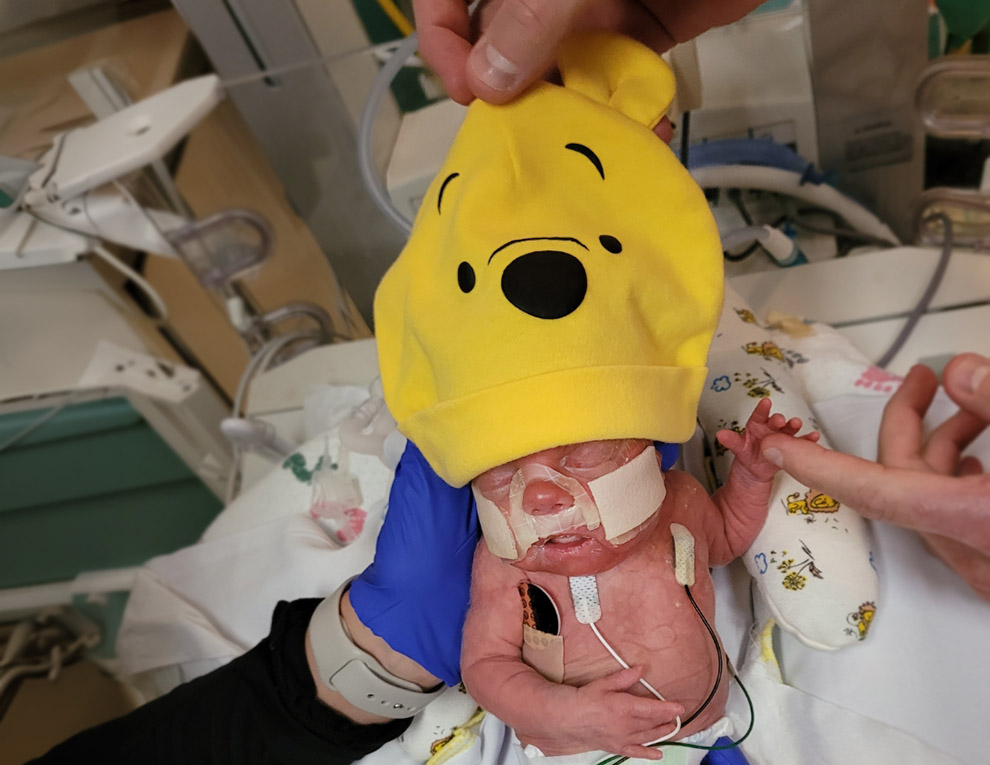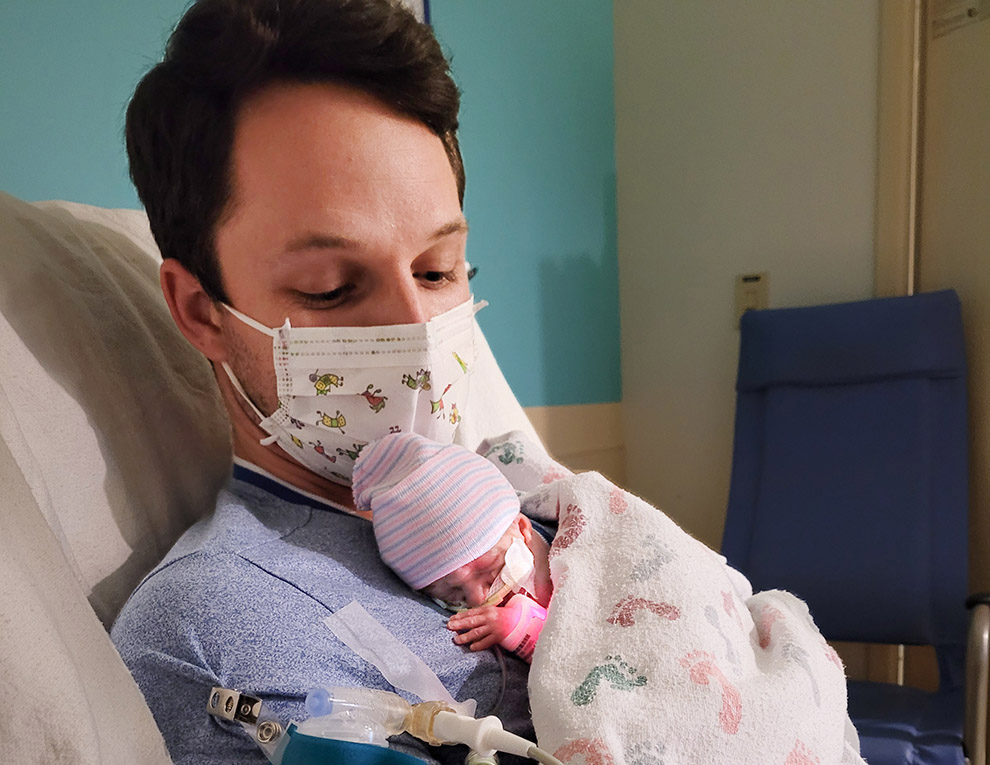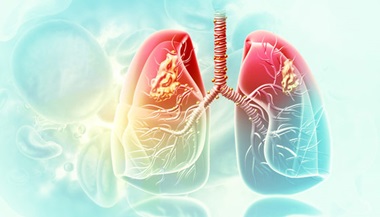Patient Story
Bronchopulmonary Dysplasia: Carter’s Story
Patient Story Highlights
- Carter was born three months early.
- Babies who are extremely premature are born before vital organs have had a chance to develop and mature.
- An experienced and compassionate neonatal intensive care unit team at Johns Hopkins All Children’s Hospital helped Carter to breathe, to grow and to beat the odds.
Yisel and Colin will never forget the first time their fiery-curled toddler threw his little body on the ground and served up a full-throated tantrum.
“We just looked at each other — and started laughing,” Yisel says.
For these parents, the moment was extraordinary, mainly because it was so undeniably normal — and “normal” feels really good these days.
Carter’s entrance into the world nearly three years ago was anything but normal.
Early Arrival
In late September of 2021, Yisel and Colin were excited about having their first child.
Six months pregnant and feeling well, Yisel encouraged her husband to join friends in Colorado for a few days, reassuring him that she would be perfectly fine at home.
After all, the baby was not due for another three months.
“I was having a very healthy pregnancy,” Yisel says, “up until the very second that I wasn’t.”
On a Saturday evening while Colin was away, Yisel’s health took a turn. She began to experience pain, pressure, and then bleeding. She knew something was very wrong.
After calling her husband to tell him what was happening, Yisel drove herself to a hospital near their home in Land O’Lakes, Florida. Medical staff there broke the news she had been terrified to hear. Her baby could not wait. He had to be born — at just 25 weeks gestation.
Colin was rushing to the Denver airport to fly back to be with Yisel when he got the devastating word.
“A baby being born at 25 weeks didn’t make sense to me,” Colin says. “I had never heard of that. I assumed that I would never get to meet my son.”
On Sept. 26 at 12:13 a.m., tiny baby Carter was born — 13 inches long, weighing only 1.5 pounds.
The infant was clinging to life. For a chance at survival, Carter needed the highest level of care.
Airlift to Johns Hopkins All Children’s

Once the baby was stabilized, LifeLine Critical Care Transport airlifted him to Johns Hopkins All Children’s Hospital in St. Petersburg, Florida. The hospital’s neonatal intensive care unit (NICU) has a level IV designation, the highest level of care available. The NICU has a full range of specialists and advanced life support and monitoring technology designed to meet the complex needs of infants who are premature and critically ill.
Carter would need all of this expertise to survive.
Babies born at 25 weeks have organs that are not fully developed and mature enough to allow them to survive without interventions. Issues with the brain, the heart, the lungs and the digestive organs are common.
Carter was placed on a ventilator. He was diagnosed with respiratory distress syndrome, which later became bronchopulmonary dysplasia — a chronic lung disease that can develop when immature lungs are exposed to the environment outside of the mother’s womb.
Neonatologist Joana Machry specializes in newborn respiratory management — in helping these fragile babies to breathe. It is a delicate dance, providing enough breathing support to sustain life, while doing everything possible to minimize damage from the therapies.
“The idea of respiratory support is not only to help the baby survive, but to properly support growth and development in such a way that they can eventually thrive,” Machry says.
For Carter and his parents, it was the beginning of a long and uncertain road. There was so much to overcome.
After several attempts, and finally with the aid of steroids, Carter was able to come off of the ventilator.
But he had more battles to wage. After a diagnosis of retinopathy of prematurity, Carter received eye injections to prevent abnormal blood vessel growth in his eyes. If left untreated, it could have led to blindness.
The baby also was challenged by severe reactions to his vaccinations. On many days, his parents felt like they were on a roller-coaster.
It was the most difficult time of their lives, and yet, Yisel and Colin were reassured and even moved by the care their baby received from the experienced and compassionate NICU team, including Machry.
“She was fantastic, really incredible,” Yisel says. “She connected with us, not just on a science level, but on a human level. I felt like she truly saw my child.”
Along this difficult path, moments gave the family sparks of hope. They’ll never forget the first time they were able to hold their baby boy. There were the times their baby “graduated” to less and less oxygen support. Colin recalls a special day when Carter received his first bath.
“We put this tiny little tub on top (of his bed) and I remember him just falling asleep,” Colin says. “It was the cutest thing.”

It is challenging to bond with a new baby in a medical setting. The parents spent as much time as they could with Carter — holding his little hands, talking to him, feeding him.
Yisel loved reading books to Carter. Her baby seemed to respond to Winnie-the-Pooh and his adventures with Christopher Robin, Eeyore and Piglet.
Going Home
By late December and into January, Carter was showing more and more signs of progress. He was learning to breathe on his own. He was eating and gaining weight. His parents were able to take on more of his care in the NICU. Gradually, they were moving toward normalcy with this little one who had been through so much.
Hope was in the air.
“I will never stop saying that Johns Hopkins All Children’s Hospital doctors, nurses and staff saved my child’s life,” Yisel says. “He would not be here today if not for their care. Everything they did for him was nothing short of incredible.”
On Feb. 10, 2022, amid celebration and emotional goodbyes from the care team, Colin and Yisel packed up their belongings and strapped their tiny boy into his car seat. After four and a half months in the NICU, Carter was discharged.
“I remember as we were finally driving home, Colin says, “I kept looking in the rearview and thinking, ‘Wow, he’s really with us. I’m taking my son home.’”
Thriving
Today, Carter is a healthy, happy, vibrant 2-year-old who never wants to sit still.
And why should he?
As Yisel looks toward a wall in their home that showcases photos from their lives, she recalls those difficult first months when she and Colin wondered if they would ever have the chance to display photos of their baby without medical tubes and hospital equipment surrounding him.
Now, the wall of photos tells a more hopeful story. There are joyful pictures of family, of Carter at Christmas, of special trips and fun moments — photos that tell the story of the tiniest baby who beat the toughest odds, of a child who is living fully and is fully loved.
Perhaps Winnie-the-Pooh said it best:
“Sometimes, the smallest things take up the most room in your heart.”








